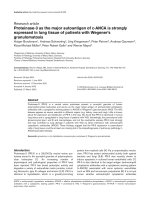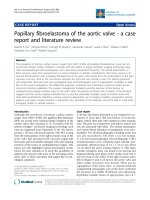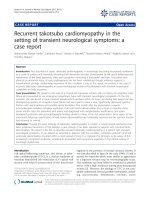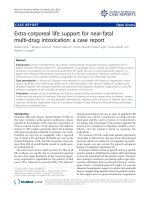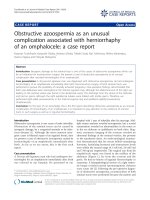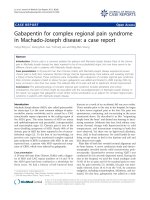Báo cáo y học: " Tongue metastasis as an initial presentation of renal cell carcinoma: a case report and literature review" pps
Bạn đang xem bản rút gọn của tài liệu. Xem và tải ngay bản đầy đủ của tài liệu tại đây (401 KB, 5 trang )
BioMed Central
Page 1 of 5
(page number not for citation purposes)
Journal of Medical Case Reports
Open Access
Case report
Tongue metastasis as an initial presentation of renal cell carcinoma:
a case report and literature review
Faisal Azam*, Muneer Abubakerr and Simon Gollins
Address: Department of Oncology, North Wales Cancer Treatment Centre, Glan Clwyd Hospital, Bodelwyddan, Rhyl, LL18 5UJ, UK
Email: Faisal Azam* - ; Muneer Abubakerr - ; Simon Gollins - simon.gollins@cd-
tr.wales.nhs.uk
* Corresponding author
Abstract
Introduction: Primary tumour of the kidney metastasizing to the tongue is very unusual and only
anecdotal cases have been reported. An exhaustive literature review covering the period from
1911 onwards disclosed 28 cases. Out of those, only 3 cases presented initially with tongue
metastases before the diagnosis of primary renal cell carcinoma.
The prognosis for patients with lingual metastasis of renal cell carcinoma is poor. Treatment of
tongue metastasis is usually palliative and aims to provide patient comfort by means of pain relief
and prevention of bleeding and infection. Surgical excision is recommended as the primary
treatment with emphasis on preservation of tongue structure and function.
Case presentation: We report a case of tongue metastasis as an initial presentation of renal cell
carcinoma in a 78-year-old man. Initially thought to be primary tongue cancer but on review of his
histopathology again, it was diagnosed to be a rare metastasis from kidney cancer.
Conclusion: Tongue metastasis from renal cell carcinoma is rare and its diagnosis is a challenge.
The prognosis of patients with tongue metastasis is poor. Similar to the primary tumours of the
tongue, metastatic lesions may be ulcerated or polypoid. Since the tongue is a rare metastatic site,
when a lesion is detected, a thorough evaluation to distinguish between metastasis and primary
cancer should be made as the management and prognosis vary.
Introduction
Metastasis to the tongue seldom occurs, and lingual
metastasis as an initial sign of cancer occurs even less fre-
quently.
Metastasis to the head and neck area from a primary site
in the abdomen is rare. Renal cell carcinoma (RCC) is the
third most common tumour after lung and breast to
metastasize to the head and neck region. Less than 15% of
patients with renal cell carcinoma actually show metasta-
sis to this area. We discuss a case of renal cell carcinoma
presenting with pathologically proven metastasis in the
tongue.
Case presentation
A 78-year-old man who was a chronic smoker presented
to the maxillofacial department at a district general hospi-
tal with a 6-week history of difficulty in swallowing solids
together with pain in his pharynx.
Published: 25 July 2008
Journal of Medical Case Reports 2008, 2:249 doi:10.1186/1752-1947-2-249
Received: 9 October 2007
Accepted: 25 July 2008
This article is available from: />© 2008 Azam et al; licensee BioMed Central Ltd.
This is an Open Access article distributed under the terms of the Creative Commons Attribution License ( />),
which permits unrestricted use, distribution, and reproduction in any medium, provided the original work is properly cited.
Journal of Medical Case Reports 2008, 2:249 />Page 2 of 5
(page number not for citation purposes)
On examination, he was noted to have a 3 × 2 cm solitary
pedunculated lesion on the right side of the anterior two-
thirds of his tongue crossing the midline. His tongue
mobility was normal and there was no palpable cervical
lymphadenopathy.
Systematic examination of chest, abdomen and heart were
normal. The lesion was biopsied and initially reported as
a primary squamous cell carcinoma with some clear cell
changes. His blood tests including renal functions were
normal. His case was discussed in the head and neck can-
cer multidisciplinary team (MDT) meeting and subtotal
glossectomy was planned after a staging MRI (magnetic
resonant imaging) scan followed by adjuvant radiother-
apy to the head and neck region. While awaiting an MRI,
he presented to the hospital with severe pain in his oral
cavity and difficulty in swallowing. His tongue lesion had
doubled in size in a matter of two weeks and was now pro-
truding outside the mouth (Figure 1). It was considered
unusual for primary squamous cell carcinoma of tongue
to behave like that. The pathology was therefore reviewed
at the same MDT meeting and this time the lesion was
reported as partly squamous epithelium covered by fibro-
muscular tissue showing infiltration by a carcinoma, seen
in the nests with extensive clear cell changes. The differen-
tial diagnosis was considered to be squamous cell carci-
noma with clear cell changes, metastatic salivary gland
neoplasm or metastases from RCC. It was decided to
arrange an urgent CT scan and to debulk the tongue lesion
surgically, to improve his symptoms. The patient had not
described any suspicious urinary symptoms.
A CT scan of the neck, chest and abdomen revealed a 4.7-
cm sized irregular mass in the left kidney suggestive of
RCC (Figure 2). There was no local extension and the left
renal vein was clear. A solitary tongue lesion with no neck
nodes was reported. No metastases were seen in the lungs,
liver, adrenals, spleen and bones.
As per the MDT decision, he underwent a debulking sur-
gery of the tongue metastasis, which was performed with-
out complication. His swallowing improved significantly.
Postoperatively, he received radiotherapy to his oral cavity
delivering a dose of 60 Grays in 30 daily fractions over 6
weeks, which was well tolerated. Radiotherapy was given
to treat the microscopic disease in his head and neck
region.
A post-radiotherapy CT scan, 18 weeks after initial presen-
tation, was arranged before radical nephrectomy, which
unfortunately revealed early evidence of lung metastases.
As the patient reported shoulder pain, a plain X-ray and
bone scan were carried out and this revealed evidence of a
solitary bone metastasis in the right scapula.
Following his debulking surgery and adjuvant radiother-
apy, he underwent a radical left-sided nephrectomy. His-
topathology confirmed a Fuhrman grade 3 clear cell
carcinoma of the left kidney with extension into the supe-
rior perirenal fat but not into the renal sinus and with no
microvascular infiltration. The maximal dimension of the
tumour was 5 cm. The patient has subsequently been
treated with interferon-alpha (dose: 3 MU, three times a
week) as a systemic treatment for his metastatic disease. A
repeat CT scan after six months of treatment showed a
complete response with no evidence of any distant metas-
tases.
Tongue metastasisFigure 1
Tongue metastasis.
CT scan showing primary tumour of left kidneyFigure 2
CT scan showing primary tumour of left kidney.
Journal of Medical Case Reports 2008, 2:249 />Page 3 of 5
(page number not for citation purposes)
Discussion
RCC may remain clinically occult for most of its course.
The classic presentation of pain, haematuria, and flank
mass occurs in a minority of patients and is often indica-
tive of advanced disease. A tumour in the kidney can
progress unnoticed to a large size in the retroperitoneum
until metastatic disease appears. It can metastasize to any
location in the body, and its propensity to metastasize to
unusual sites has been well documented. Approximately
30% of patients with renal carcinoma present with meta-
static disease, 25% with locally advanced renal carcinoma,
and 45% with localized disease [1]. About 75% of
patients with metastatic renal carcinoma have metastases
to the lung, 36% to soft tissues, 20% to bone, 18% to liver,
8% to cutaneous sites and 8% to the central nervous sys-
tem [2]. Approximately 15% of renal cell carcinomas
metastasize to the head and neck region – specifically, to
the paranasal sinuses, larynx, jaws, temporal bones, thy-
roid gland, and parotid glands [3,4]. Tongue metastasis is
rare.
After an exhaustive literature search, we found 28 cases
which had been reported since 1911 (Table 1). Tongue
metastasis as an initial presentation of RCC is extremely
rare and we found only three cases published in the liter-
ature so far, reported in 1987, 1994 and 1996 (Table 2).
Possible routes of metastatic spread to the tongue are the
arterial, venous and lymphatic circulation. Metastases are
mostly located on the base of the tongue possibly due to
its rich vascular supply, through the dorsal lingual artery,
and due to immobility as compared to other parts of the
tongue. RCC invades the local vascular network of the kid-
ney and spreads through the systemic circulation. Head
and neck metastasis is commonly associated with lung
metastases. If there are no signs of pulmonary disease, as
in our case initially, it is possible that spread has been via
Batson's venous plexus or via the thoracic duct. Batson's
venous plexus extends from the skull to the sacrum. This
valveless system theoretically offers less resistance to the
spread of tumour emboli, especially when there is an
increase in intrathoracic and intra-abdominal pressure,
allowing retrograde flow by-passing pulmonary filters [5].
Table 1: Previous case reports of renal cell carcinoma metastasizing to tongue
S No Author. Year Age/sex Site Other metastases
1 Kostenko 1911 43/M
2 Coenen 1914 62/F
3 McNattin & Dean 1931 58/M Lung, heart, skin
4 Trinca & Willis 1936 57/M
5 Schrag 1945 34/M Lung
6 Del Carmen 1970 77/M None
7Satomi et al. 1974 41/F Left surface Lung
8 Friedlander 1979 84/M Tip of tongue Lung
9 Fitzgerald 1982 63/M Right dorsum Brain
10 Kitao et al. 1986 37/M BOT None
11 Inai 1987 42/M Left base Lung
12 Matsumota & Lio 1987 77/F Left surface Lung
13 Kapoor 1987 70/M Not mentioned Not mentioned
14 Madsion & Fereson 1988 63/M Right ventral surface Lung, liver
15 Ishikawa 1991 59/F Lung, bone
16 Okabe et al. 1992 58/M Left base Lung, brain
15 Shibyama 1993 41/M BOT Lung, bone, lymph nodes
16 Ziyada 1994 59/M Right base None
17 Aguirre 1996 82/F Tip of tongue Brain
18 Airoldi 1995 51/M Lung
19 Konya 1997 59/M Para-aortic, lymph nodes
20 Tomita 1998 50/M Left border Lung, brain, skin
21 Goel 1999 62/M Left surface Lung
22 Navarro et al. 2000 62/M Right lateral Lung
23 Fukuda 2002 74/M Left side
24 Mariomi et al. 2002 87/F Dorsum Lung, liver, thyroid, pancreas
25 Emer et al. 2003 45/M Tip of tongue Nose, lungs
26 Kyan & Kato 2004 66/M Base of tongue Lungs
27 Torres-Carranza 2006 49/F Middle third of dorsum Lungs
28 Huang & Chang 2006 76/F BOT Lungs, liver
29 Present case 2007 68/M Anterior right lateral Lungs, bone
BOT, base of tongue.
Journal of Medical Case Reports 2008, 2:249 />Page 4 of 5
(page number not for citation purposes)
Nephrectomy may be justified in patients with metastatic
disease to improve quality of life or local symptoms and
to confer a possible survival advantage [6]. However, it is
not justified when the intention is to induce spontaneous
tumour regression which occurs in less than 1% of cases.
Management of tongue metastasis is surgical excision and
this was followed in our patient by adjuvant radiotherapy
to achieve local control of disease. Chemotherapeutic
agents including fluoropyrimidines together with biolog-
ical agents such as interferon-α can offer a palliative ben-
efit in some patients with RCC. Shibayama et al. reported
a complete response in a base of the tongue metastasis
after interferon-α therapy [7]. Newer agents such as soraf-
enib and sunitinib have been shown to improve progres-
sion-free survival in metastatic RCC [8,9]. Temsirolimus
and bevacizumab have also shown promise in early phase
trials.
A thorough evaluation to distinguish between primary
and secondary tongue cancer is essential. Primary cancer
of the tongue is treated with curative intent and this
includes total glossectomy with or without neck node dis-
section followed by radical radiotherapy in the early
stages and concomitant chemotherapy (cisplatinum and
5 fluorouracil) and radiotherapy in the later stages.
Secondary tumours of the tongue are managed with palli-
ative intent, which includes surgery, radiotherapy and
immunotherapy. The prognosis of metastatic RCC is poor
and 5-year survival is less than 10%.
Conclusion
Twenty-eight case reports of tongue metastasis from kid-
ney cancer since 1911 have been documented (Table 1)
and its occurrence as a presentation of kidney cancer was
found to be extremely rare with only three cases reported
in the last century (Table 2) before the current case.
Metastatic spread to the tongue may occur in advanced
stages of RCC. The prognosis of patients with tongue
metastasis is poor because most of them have widespread
disease. Similar to primary tumours of the tongue, meta-
static lesions may be ulcerated or polypoid. Clinical and
even histological differentiation between the two condi-
tions can be challenging. Since the tongue is a rare meta-
static site, when a lesion is detected, a thorough
evaluation should be made to distinguish between metas-
tasis and primary cancer, so that appropriate treatment
can be offered.
Abbreviations
RCC: Renal cell carcinoma; MRI: Magnetic resonance
imaging; CT: Computed tomography; MDT: Multidiscipli-
nary team.
Competing interests
The authors declare that they have no competing interests.
Authors' contributions
FA assisted in the conception and design of the paper, and
also helped in the acquisition, review and interpretation
of the data. MA contributed towards data collection and
drafting of the manuscript. SG was involved in concep-
tion, reviewing and finally approving the version to be
published. All authors read and approved the final manu-
script.
Consent
Written and informed consent was obtained from the
patient for publication of this case report and any accom-
panying images. A copy of the written consent is available
for review by the Editor-in-Chief of this journal.
References
1. Golimbu M, Joshi P, Sperber A, Tessler A, Al-Askari S, Morales P:
Renal cell carcinoma: survival and prognostic factors. Urology
1986, 27(4):291-301.
2. Maldazys JD, deKernion JB: Prognostic factors in metastatic
renal carcinoma. J Urol 1986, 136:376.
3. Som PM, Norton KI, Shugar JM, Reede DL, Norton L, Biller HF: Met-
astatic hypernephroma to the head and neck. AJNR Am J Neu-
roradiol 1987, 8:1103-1106.
4. Boles R, Cemy J: Head and neck metastases from renal carci-
nomas. Mich Med 1971, 70:616-618.
5. Cheng ET, Greene D, Koch RJ: Metastatic renal cell carcinoma
to the nose. Otolaryngol Head Neck Surg 2000, 122:464.
6. Rabinovitch RA, Zelefsky MJ, Gaynor JJ, Fuks Z: Patterns of failure
following surgical resection of renal cell carcinoma: implica-
tion for adjuvant local and systemic therapy. J Clin Oncol 1994,
12:206-212.
7. Shibayama T, Hasegawa S, Nakamura S, Tachibana M, Jitsukawa S, Shi-
tani A, Morinaga S: Disappearance of metastatic renal cell car-
cinoma to the base of the tongue after systemic
administration of interferon-α. Eur Urol 1993, 24:297-299.
Table 2: Tongue metastasis as the initial presentation of renal cell carcinoma
S No Authors Year Age/sex Site Other metastases
1 Kapoor et al. [10] 1987 70/M Not mentioned Not mentioned
2 Ziyada et al. [11] 1994 59/M Right BOT None
3 Aguirre and Rinaggio [12] 1996 82/F Tip of tongue Brain
5 Present case 2007 68/M Anterior right lateral Lungs, bone
BOT, base of tongue.
Publish with BioMed Central and every
scientist can read your work free of charge
"BioMed Central will be the most significant development for
disseminating the results of biomedical research in our lifetime."
Sir Paul Nurse, Cancer Research UK
Your research papers will be:
available free of charge to the entire biomedical community
peer reviewed and published immediately upon acceptance
cited in PubMed and archived on PubMed Central
yours — you keep the copyright
Submit your manuscript here:
/>BioMedcentral
Journal of Medical Case Reports 2008, 2:249 />Page 5 of 5
(page number not for citation purposes)
8. Motzer RJ, Hutson TE, Tomczak P, Michaelson MD, Bukowski RM,
Rixe O, Oudard S, Negrier S, Szczylik C, Kim ST, Chen I, Bycott PW,
Baum CM, Figlin RA: Sunitinib versus interferon alfa in meta-
static renal-cell carcinoma. N Engl J Med 2007, 356(2):115-124.
9. Escudier B, Eisen T, Stadler WM, Szczylik C, Oudard S, Siebels M,
Negrier S, Chevreau C, Solska E, Desai AA, Rolland F, Demkow T,
Hutson TE, Gore M, Freeman S, Schwartz B, Shan M, Simantov R,
Bukowski RM, TARGET Study Group: Sorafenib in advanced
clear-cell renal-cell carcinoma. N Engl J Med 2007,
356(2):125-134.
10. Kapoor VK, Mukhopadhyay AK, Chattopadhyay TK, Sharma LK:
Renal cell carcinoma metastatic to the tongue. J Indian Med
Assoc 1987, 85(4):119-120.
11. Ziyada WF, Brookes JD, Penman HG: Expectorated tissue lead-
ing to diagnosis of renal adenocarcinoma. J Laryngol Otol 1994,
108:1108-1110.
12. Aguirre A, Rinaggio J: Lingual metastasis of renal cell carci-
noma. J Oral Maxillofac Surg 1996, 54:344-346.
